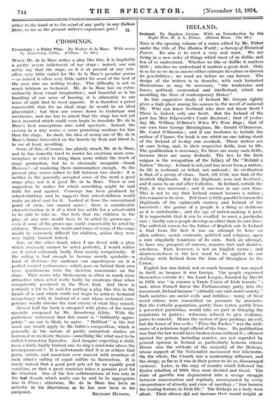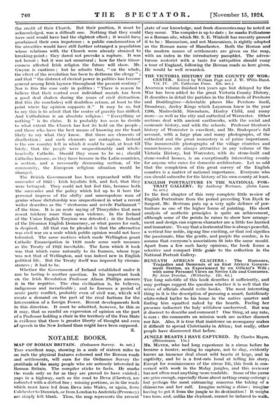IRELAND.
Ireland. By Stephen Gwynn. With an Introduction by the Tins is the opening volume of a series edited by Mr. Fisher under the title of The Modern World ; a Survey of Historical Forces. Its aim is to meet a very real want. We are living in a new order of things which most of us dislike and few of us understand. Whether we like or dislike it matters little ; whether we understand it matters a great deal. Only in so far as we do so can we either estimate its values or discern its possibilities ; we must see before we can foresee. The design of the writers is to describe, with such historical illustrations as may be necessary, " the tendencies and forces, political, economical and intellectual, which are moulding the lives of contemporary States."
In this suggestive study of Ireland Mr. Gwynn rightly gives a high place among his sources to the novel of national life. Who can know Scotland who does not know Scott ? There is, indeed, only one Scott. But the Ireland of the past has Miss Edgeworth's Castle Rackrent ; that of yester- day Mr. William O'Brien's When We Were Boys ; that of our own time George Birmingham, Mr. Gerald O'Donovan, Mr. Conal O'Riordan ; and if one hesitates to include the author of Ulysses. the book is one which no one taking stock of the Ireland of to-day can overlook. Those writers are at once living, and, in their respective fields, true to life. The qualification is necessary, for there are many such fields, because there are many Irelands. The key to the Irish enigma is the recognition of the fallacy of the "Ireland a Nation" theory. Ireland is not, and has never been, a nation ; its life is sectional, or tribal, not national ; its civilization is that of a group of clans. Such, till 1746, was that of the Scottish Highlands. But the Highlands were not Scotland ; and it came to an end after Culloden. In Ireland, outside the Pale, it was universal ; and it survives in our own time. This is not to say that Ireland cannot become a nation ; this remains to be seen. But there is little parallel between the Highlands of the eighteenth century and Ireland of the twentieth ; the genius of a people is a thing as stubborn as it is undefinable ; and the age of nation-making is past. It is improbable that it can be recalled to meet a particular case ; hardly can a people develop on other than its own lines. The sufficient reason for the failure of 1inglish rule in Ireland is that from the first it was an attempt to force an alien culture, social, economic, political and religious, upon a race singularly tenacious of its own. Such an attempt, to have any prospect of success, requires tact and disinter- estedness. Tact, however, is not an English virtue ; and disinterestedness is the last word to be applied to our dealings with Ireland from the time of Strongbow to the Union.
English law was hated, not so much because it was unjust in itself, as because it was foreign. The people organized themselves outside it ; the Land League, founded by Devitt in 1879, was " in essence a Trade Union of Irish tenants " ; and, when Parnell threw the Parliamentary party into the movement, Ireland became " virtually one vast secret society." Such societies are social evils and ruthless : many of their worst crimes were committed on peasants by peasants. But the Catholic population, partly from terror, partly from a perverted patriotism, would take no part in bringing the murderers to justice ; witnesses refused to give evidence, juries to convict. Hence the system of jury packing; an evil, but the lesser of two evils: "Peter the Packer" was the nick- name of a notorious legal official of the time. Its justification -was that the law would have broken down without it ; offences against the person, including murder, are not regarded by general opinion in Ireland as particularly heinous crimes. Hence also the attitude of the majority of the Bishops, whose support of the Nationalist movement was lukewarm. On the whole, the Church was a moderating influence, and the clergy, as far as it was in their power to do so, discouraged• violence. Later, in the orgy of murder which followed the Easter rebellion of 1916, they were divided and timid. The state of guerilla war degenerated into a savage struggle between assassination and reprisals, accompanied by every circumstance of atrocity and even of sacrilege ; " fear became the leading feature in Irish life." The Bishops as a body were silent. Their silence did not increase their moral weight of
the credit of their Church. But their position, it must be acknowledged, was a difficult one. Nothing that they could have said would have had the slightest effect ; it would have proclaimed their own impotence ; a public condemnation of the atrocities would have still further estranged a population whose relations with the Church were already strained to breaking-point ; they dared not provoke a rupture. It was not heroic ; but it was not unnatural ; how far their timor- ousness affected Irish religion the future will show. Mr. Gwynn is cautious ; but he admits that, " on the whole, the effect of the revolution has been to dethrone the clergy " ; and that " the distrust of clerical power in politics has become general among Irish laymen throughout the present century.'' Nor is this the case only in politics : " There is reason to believe that their control over individual morals has been a good deal shaken during the years of civil distraction. But this (he concludes) will doubtless return, at least to the point where lay opinion supports it." It may be so, but to say this is to admit that the centre of gravity has shifted. And Catholicism is an absolute religion : " Everything or nothing " is its claim. It is probably too soon to decide to what extent the Church has lost its hold on the people ; and those who have the best means of knowing are the least likely to say what they know. But there are elements of disaffection ; and such elements are contagious. Ireland is the one country left in which it could be said, at least till lately, that the people were unquestionably and whole- heartedly Catholic. Should they cease to be so ; should Catholics become, as they have become in the Latin countries, a section, and a necessarily decreasing section, of the community, the European religious situation would be changed.
The British Government has been reproached with the surrender of 1922 ; Irish loyalists felt, and feel, that they were betrayed. They could not but feel this, because both the surrender and the policy which led up to it bore the personal impress of the shifty and unscrupulous man of genius whose dictatorship was unquestioned in what a recent writer describes as the " stertorous and servile Parliament " of the time. It is an acute saying of Thucydides that men resent trickery more than open violence. In the Ireland of the Union English Toryism was detested ; in the Ireland of the Disunion English Democracy, or what passes for such, is despised. All that can be pleaded is that the alternative was civil war on a scale which public opinion would not have tolerated. The same motives which made Wellington grant Catholic Emancipation in 1829 made some such measure as the Treaty of 1922 inevitable. The form which it took was that which came naturally to its framers, whose type was not that of Wellington, and was indeed new in English political life. But the Treaty itself was imposed by circum- stances ; it had to be.
Whether the Government of Ireland established under it can be lasting is another question. In his important book on the Irish Revolution Professor Alison Phillips answers it in the negative. The clan civilization is, he believes, indigenous and ineradicable ; and he foresees a period of acute party conflict, probably even of civil war, which wil create a demand on the part of the rival factions for the intervention of a foreign Power. Recent developments look in this direction. It must be admitted, however, be this as it may, that so candid an expression of opinion on the part of a Professor holding a chair in the territory of the Free State is evidence that there is greater liberty of thought and even of speech in the New Ireland than might have been supposed.
Z.











































 Previous page
Previous page